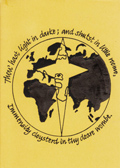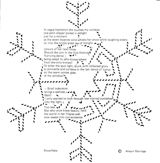The fact that Words by the Water is one of my favourite festivals is partly due to the fact that it always has a wonderful range of talks and readings, covering the arts, sciences, history and culture. The other reason is that we stay in the most beautiful campsite on the shore of Derwentwater, where the water laps the grass a few metres from the van and we walk across the grassy hill to the Theatre by the Lake each day.

 Ah yes, ‘the water laps the grass a few metres from the van’ … That’s in a normal year. This year there was a mighty storm on our first night, and when we woke (after much buffeting through the small hours) the water was only a few feet from us, and there was a huge puddle just outside our door.
Ah yes, ‘the water laps the grass a few metres from the van’ … That’s in a normal year. This year there was a mighty storm on our first night, and when we woke (after much buffeting through the small hours) the water was only a few feet from us, and there was a huge puddle just outside our door.
… But it was still beautiful, and we were perfectly snug in our little van.
Leaping over or sloshing through the puddles we made our way to the Theatre by the Lake and settled into the festival.
The first event was ‘A Love of Poetry’ by Louis de Bernieres. I hadn’t  realised before that this novelist also writes poetry. He spoke interestingly about his family history, and his ancestor coming over from France in the time of Louis XIV, when Protestants were being persecuted in France, and subsequently fighting on the side of William of Orange in the Battle of the Boyne.
realised before that this novelist also writes poetry. He spoke interestingly about his family history, and his ancestor coming over from France in the time of Louis XIV, when Protestants were being persecuted in France, and subsequently fighting on the side of William of Orange in the Battle of the Boyne.
 The festival includes some short introductory presentations of half an hour, and Jolyon Mitchell gave one of these on the subject of Martyrdom, which is the title of his most recent book. The presentation was illustrated with slides of varying horror, ranging over modern martyrs right back through history. Half an hour was unsatisfactorily short for this talk, which was, of necessity, rather rushed. However, it left us with plenty of interesting questions for reflection and discussion.
The festival includes some short introductory presentations of half an hour, and Jolyon Mitchell gave one of these on the subject of Martyrdom, which is the title of his most recent book. The presentation was illustrated with slides of varying horror, ranging over modern martyrs right back through history. Half an hour was unsatisfactorily short for this talk, which was, of necessity, rather rushed. However, it left us with plenty of interesting questions for reflection and discussion.
 My final treat of the first day was a reading by the poet Blake Morrison. The title of the event was ‘News that Stays News’, which was appropriate for a poet who began writing poetry years ago, went on to write prose (in particular the biographies of both his parents) and has now returned to the poetry fold. Many of his poems have a political angle and he also covered floods, coastal erosion, happiness and relations. Blake has a new collection coming out next year, but while waiting for that he has published a pamphlet of poems all of which start with the words ‘‘This poem ..’ in recognition of the fact that poets so often introduce their poems at readings with these words.
My final treat of the first day was a reading by the poet Blake Morrison. The title of the event was ‘News that Stays News’, which was appropriate for a poet who began writing poetry years ago, went on to write prose (in particular the biographies of both his parents) and has now returned to the poetry fold. Many of his poems have a political angle and he also covered floods, coastal erosion, happiness and relations. Blake has a new collection coming out next year, but while waiting for that he has published a pamphlet of poems all of which start with the words ‘‘This poem ..’ in recognition of the fact that poets so often introduce their poems at readings with these words.
It is not possible to go to all the events in a festival as it would break the bank and render one’s  legs entirely useless, so we took a few hours off on Saturday to explore. We had hoped to visit Wordsworth’s house in Cockermouth, but unfortunately it was not due to open until the following day – though we did watch a wedding party arrive for their celebrations. More successful was the walk up to Spout Force waterfall, which has clearly benefitted from the months of wet weather.
legs entirely useless, so we took a few hours off on Saturday to explore. We had hoped to visit Wordsworth’s house in Cockermouth, but unfortunately it was not due to open until the following day – though we did watch a wedding party arrive for their celebrations. More successful was the walk up to Spout Force waterfall, which has clearly benefitted from the months of wet weather.

We were back in Keswick in time for the evening presentation by Princess Michael of Kent on her historical novel, ‘The Queen of Four Kingdoms’. Rather than outlining the story of the book, Princess Michael talked fluently for an hour about the historical background to the time of Yolande of Aragon. Illustrated by a number of pictures, some of which, such as those from the Tres Riches Heures du Duc de Berry, dated from the same period, this was a fascinating introduction to a slice of French history; and it introduced some facts both about Joan of Ark and about the Battle of Agincourt, which were unfamiliar.
1 Comment






